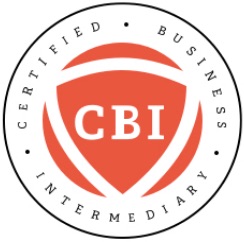Business Brokers: What Sellers Look For
Business brokers need a reputation for credibility – though whether you’re a business broker, a business owner/seller or a business buyer, I doubt I’m telling you anything you don’t already know.
A broker’s reputation comes over time and is gained in small doses in different ways, each of which adds to the broker’s overall credibility.
One way to gain credibility is by association. In our course, “The Basic “How-To” of Becoming a Business Broker” (see below), I discuss the pros and cons of starting out with an existing firm versus going solo right away. Another is by piggy-backing on another profession. In our course I also discuss how a real estate agent can capitalize on their existing business credibility to hit the ground running.
But in this post, I want to review a couple of the ways a business broker can illustrate his or her credibility. You can be sure that your potential clients – whether they read this post or not – will be looking for and asking about these things.
Certifications
Certifications are a sure way to augment your credibility but getting certified in almost anything takes time and experience. I started Worldwide Business Brokers in 2001 and the only certifications I had for the first decade had to do with real estate. The fact that much of this credibility pertained to commercial real estate – specifically, the CCIM courses – helped insofar as most businesses occupy real estate, either as owners or tenants, and those courses allowed me to speak intelligently with business owners about how the real estate they occupied impacted the value and eventual sale of their business.
 I did not receive any business brokering certifications until 2015, when I was awarded the designation CBI, or Certified Business Intermediary, a certification granted by the International Business Brokers Association.
I did not receive any business brokering certifications until 2015, when I was awarded the designation CBI, or Certified Business Intermediary, a certification granted by the International Business Brokers Association.
But it took several years and many thousands of dollars to complete the required courses, attend the requisite number of conferences and complete the necessary number of deals to qualify to take the exam. When I received my CBI designation, there were fewer than 600 CBIs in the world.
But if a broker is in the process of getting a certification – or even just taking business brokering courses without seeking a certification – those efforts should be highlighted in the broker’s online resumé, any valuation report the broker authors and the marketing package developed to market the broker’s services.
In some areas, business brokers are required to be licensed, albeit for some inexplicable reason, as a real estate agent.
Aside from our courses, there are several business broker franchises out there, all of which have some sort of training program.
Experience
Needless to say, any experience a broker has is extremely helpful when a business owner wants to gauge credibility, but how can you demonstrate such experience if you’re just starting out? You can’t.
If you’re going to practice in an area that requires a real estate license, you can overcome this problem to some degree simply be getting such a license, the possession of which will give potential clients a certain sense of confidence that you’ve gone through some remotely related training.
 Another way is to take some courses.
Another way is to take some courses.
Anyone that completes our course receives a graphic certifying that the course was completed and that graphic an be used on the broker’s website, business cards, email signature and other marketing materials.
But those remedies will rarely work if the broker wants to jump into the deep end and start brokering multi-million dollar deals. In that case, finding a friend or business associate that wants to sell a business is probably the only way to get such listings.
We recommend that someone starting out, begin in the Main Street, or “mom and pop” Market. In our experience, the owners of these smaller businesses are less particular about whether you’ve sold an Italian restaurant or a marine repair business.
Once you get some experience, though, you might wish to specialize.
The owners of larger businesses will want to know that you have experience in selling their specific type of business. For example, the owners of a automobile dealership will generally want to work with a broker that has sold such businesses.
But there’s another way to get some experience and that involves co-broking.
Co-broking is when one broker sells another broker’s listing. If you join any of the online business listing services, you’ll be able to see thousands of listed businesses. If you filter for your geographic area, you’ll be able to see what’s for sale nearby. Contact the broker to make sure they’ll co-broke. Some won’t, so don’t waste your time trying to sell their business listings.
Marketing Program
This is one aspect in which even a beginner can shine.
With the right training, a beginning business broker can develop and present a marketing package that can rival most large and more experienced brokerages. A professional marketing package – one geared to the specific business and client – will go a long way in offsetting any deficiencies in the experience category.
This is one of the methods I used when I started. How did I know how to design and produce such a package? The commercial real estate training that I took over the years gave me a sense of what a buyer would want to see. After producing comprehensive marketing packages for a couple of businesses, I was able to make minor revisions that I sensed would be important to business owners. Now, we get all sorts of comments about how thorough our marketing materials are. There’s even a glowing testimonial from an attorney (of ALL people!) about this on our website.
We offer coaching on, among other things, developing comprehensive marketing packages. If you’d like to discuss that, let me know at Jo*@*******************og.com.
_____________________________________________________________________________
Our course, The Basic “How-To” of Becoming a Business Broker”, teaches how to market and sell businesses.
Become a Professional Business Broker…
Fee
Business brokers generally are paid a commission or “success fee” at the closing of the transaction.
This fee is structured differently by different brokers but generally ranges between 8% and 10% for Main Street deals. The larger the deal, the more likely the fee structure will deviate from that simple formula. Once you’re in the Middle Market – which we define as businesses with transaction values of roughly $2 million up to about $20 million – the aggregate fee will generally be lower.
There is longstanding debate in our industry about up-front fees. As a rule, we advise against any up-front fees (except for valuation work) if you are working in the Main Street Market. Owners of Main Street businesses are generally more accustomed to how real estate agents work and, if a broker wants to be competitive, it may be hard to sell a potential client on an up-front fee.
On the other hand, owners or larger business are generally more sophisticated and understand that a broker will be spending a lot of time and money finding the right buyer. Such owners are usually more receptive to paying a properly-structured retainer. Experienced brokers will equate themselves to the business owner’s other professional advisors including attorneys, accountants an financial planners, none of who will work without a retainer or agreement to be paid hourly.
Testimonials
This – like listing your transaction experience – is tough if you’re just starting out as a broker and comes to bear once you’ve advised some clients.
Business consulting is part of our work and, though such consulting may not turn into an immediate listing to sell a business, the owner of the business that you’re consulting for is an excellent source of a testimonial.
If you followed the “glowing testimonial” link earlier in this post, you will have seen that we have testimonials from sellers, buyers, consulting clients, lenders, etc. All this adds to credibility.
The Bottom Line
As in any other business, credibility is important to business brokers. It takes patience, effort and experience to develop it but, like gaining weight, it occurs over time, little by little. The difference is that by gaining weight, you get fat. By gaining credibility, you get “phat“!

“Fat” ↑ versus ↓”Phat”

If you have any questions, comments or feedback on this topic – or any topic related to business – I want to hear from you. Put them in the Comments box below. Start the conversation and I’ll get back to you with answers or my own comments. If I get enough on one topic, I’ll address them in a future post or podcast.
I’ll be back with you again next Monday. In the meantime, I hope you have a safe and profitable week!
Joe
 #business #businessacquisition #sellabusiness #becomeabusinessbroker #businessbrokering #businessvaluation #MergersandAcquisitions
#business #businessacquisition #sellabusiness #becomeabusinessbroker #businessbrokering #businessvaluation #MergersandAcquisitionsThe author is the founder of Worldwide Business Brokers and holds a certification from the International Business Brokers Association (IBBA) as a Certified Business Intermediary (CBI) of which there are fewer than 1,000 in the world. He can be reached at jo*@*******************og.com

